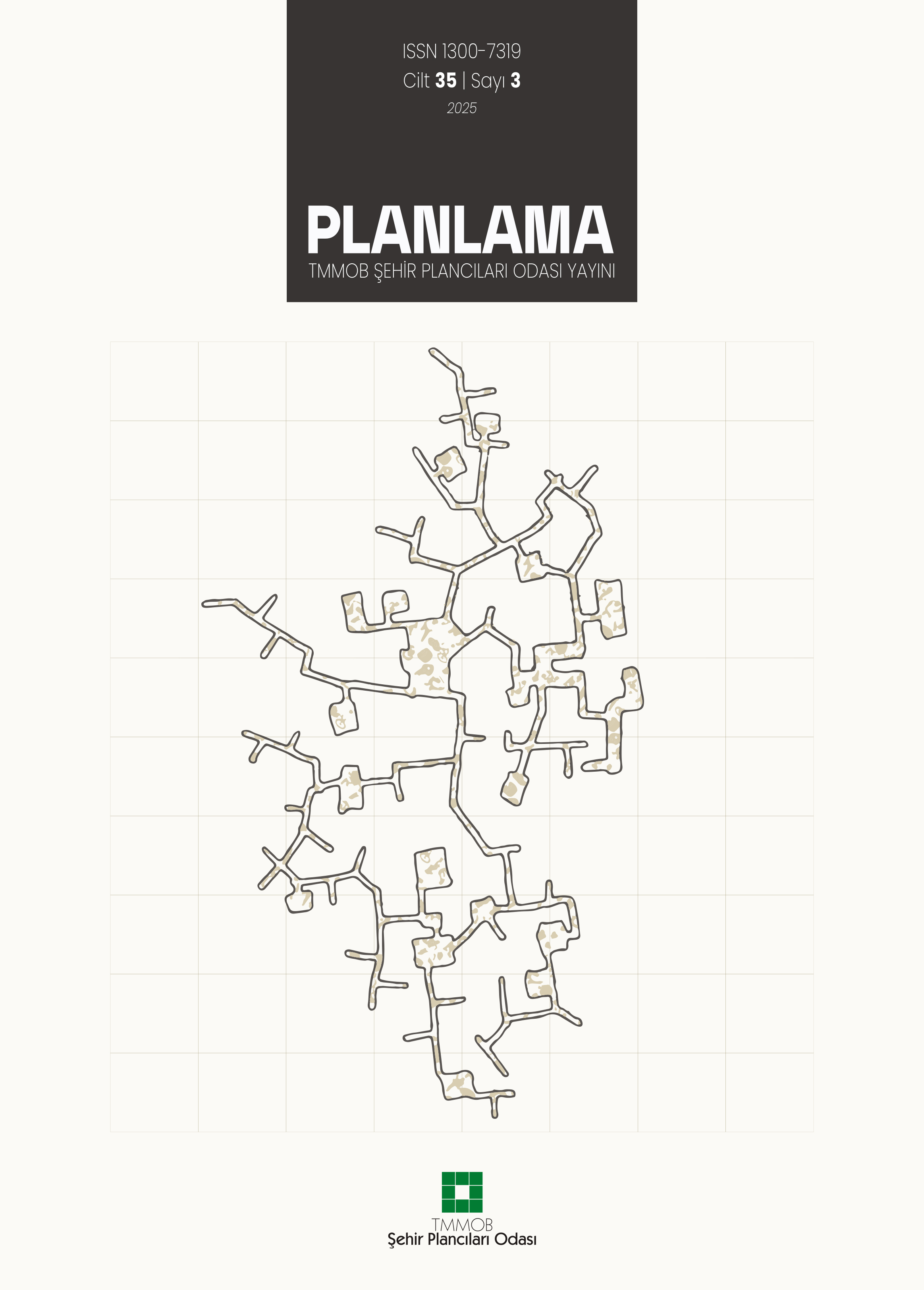Desantralizasyon, Basitleştirme, Deregülasyon ve Yeniden-regülasyon Politikaları Kapsamında Planlamanın Araçsallaştırılması; Bursa’da Riskli Yapı Tespitine Dayalı Parsel Bazındaki Plan Değişikliklerinin Kentsel Mekana Etkisi
Zeynep Ece Güler1, Levent Ünverdi21Dokuz Eylül Üniversitesi Fen Bilimleri Enstitüsü, Şehir ve Bölge Planlama Anabilim Dalı, İzmir2Dokuz Eylül Üniversitesi Mimarlık Fakültesi, Şehir ve Bölge Planlama Anabilim Dalı, İzmir
1980’li yıllardan itibaren, Türkiye’de uygulanan neoliberal süreçlerin, kentlere ilişkin biçtiği yeni rol tanımı içerisinde özellikle metropoliten kentler, küresel sermaye açısından önemli düğüm noktaları olarak yeniden örgütlenmiştir. Bu örgütlenmeyle birlikte mekansal yapı da değişim ve dönüşüme uğramıştır. Metropoliten kentlerin süregelen değişim ve dönüşümünü yönlendiren temel politikaların belirlenmesinde ise 2000’li yıllardan itibaren kentler üzerinden şekillenen küresel sermayeye eklemlenme çabasının bütünleyicisi olarak yerelleşme eğilimleri etkili olmuştur. Pek çok ülke gibi Türkiye’de de inşaat sektörünün desteklenmesi, makroekonominin gelişmesi için politik bir araç olarak kullanılmıştır. Bu bağlamda birikim hızının arttırılmasındaki engellerin aşılması için devlet tarafından yapılan doğrudan ve dolaylı kamu altyapı yatırımları, yasal ve yönetsel düzenlemeler, planlama ve imar düzeninin basitleştirilmesi ile bunların desantralizasyonu, deregülasyonu ve yeniden-regülasyonu gözlenmiştir. Mekanın metalaşmasını hedef alan birikim stratejisini kolaylaştıracak mekansal sabitler olarak kentsel dönüşüm uygulamaları, planlama pratiğine bir araç olarak girmiş ve imar ve planlama yetkilerinin çok büyük oranda yerel yönetimlere devredilmesi mekanın metalaşmasını hedef alan birikim stratejisini kolaylaştırmıştır. Devlet gücünün bir kısmının, imar ve planlama yetkilerinin devri sayesinde, kilit hale gelen ve en etkin yerel devlet kurumları olan belediyelere aktarılması, kamu-özel işbirliklerinin de önünü açan bir merkezi strateji olmuştur. Sermayenin yerelde devletle temasını arttırarak ona yeni birikim alanları açan bu stratejinin bir örneği olarak 6306 sayılı Kanun kapsamında riskli yapılara ilişkin onay yetkisi Bursa Büyükşehir Belediye Başkanlığı’na devredilmiştir. Bu çalışmanın temel amacı söz konusu yetki devrinin Bursa’da kentsel mekana etkilerinin ortaya konmasıdır. Bu kapsamda çalışmada izlenecek yöntem riskli yapı tespiti yapılan parseller ve yetki devri kapsamında riskli yapı tespiti halinde emsal artışı verilmesine ilişkin onaylanan plan değişiklikleri verilerinin; dönemsel, mekansal dağılımı ve yoğunlaşma eğilimleri ile kentsel mekana etkilerinin incelenmesidir. Çalışmada elde edilen bulgu neoliberal politikalar kapsamında sermayenin önündeki engellerin gevşetilmesi için yerelin yetkilendirilmesi yoluyla planlama ve imar düzeninin serbestleştirilmesi ve kuralsızlaştırılması sürecinin, dönüşümün kamusal yarar temelinden uzak, yaşam standartlarını düşüren parsel bazında uygulamalara evrilmesine neden olduğu ve kentsel dönüşümün mekandaki yöneliminin risk faktöründen çok ekonomik beklentiler temelinde acil müdahaleye ihtiyaç duymayan bölgelerde kendini gösterdiğidir.
Anahtar Kelimeler: Bursa, decentralization; deregulation; plan amendment; re-regulation; risky building; simplification.
Instrumentalization of Planning Within the Scope of Decentralization, Simplification, Deregulation and Re-regulation Policies; the Impact of Parcel-scale Plan Amendments for Risky Buildings Upon Urban Space in Bursa
Zeynep Ece Güler1, Levent Ünverdi21Deparment of City and Regional Planning, Dokuz Eylul University The Graduate School of Natural and Applied Sciences, Izmir, Turkey2Deparment of City and Regional Planning, Dokuz Eylul University Faculty of Architecture, Izmir, Turkey
Metropolitan cities in Turkey have been re-organized to play a significant role for global capital as result of the neoliberal process after the 1980s. Consequently, the spatial structure has also undergone a change and transformation. Localization, which is an indispensable part of Turkey integration process into the global capital through cities since the 2000s, has been determinant in setting up the basic policies to govern the ongoing change and transformation of metropolitan cities. Like many countries, the construction sector has been purposely supported used as a political tool for the development of macroeconomics in Turkey as well. In this regard, direct and indirect public infrastructure investments, legal and administrative arrangements, simplification of planning and zoning, and decentralization, deregulation and re-regulation of the state have all been used as steps taken to overcome the obstacles against acceleration of the accumulation rate. Urban regeneration practices, as spatial constants facilitating the accumulation strategy aimed at the commodification of space, became the key tool in planning practices while the authority of zoning and planning was transferred to local administrations to a great extent. Decentralization became the central strategy that paved the way for public-private cooperation. As an example of this strategy in Bursa, the authority for approval of the buildings at risk was transferred to Bursa Metropolitan Municipality. The main purpose of this study is to reveal the effects of this shift in authority upon urban space in Bursa. In this context, the method to be followed in the study is to determine the parcels with risky buildings and to analyze the data on the approved plan amendments within the scope of periodic, spatial distribution and concentration trends and their impact upon urban space. The findings obtained in this study reveal that the process of liberalization and deregulation of planning and zoning processes through the empowerment of local authority to loosen the barriers to capital within the scope of neoliberal policies has led to loss of public benefit in urban regeneration practices, while focusing on economic expectations and decreasing urban living standards as it mostly takes place in areas not requiring emergent intervention.
Keywords: Bursa, desantralizasyon; deregülasyon; plan değişikliği; yeniden-regülasyon; riskli yapı; basitleştirme.
Makale Dili: Türkçe














